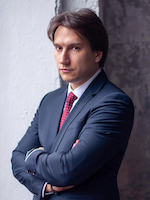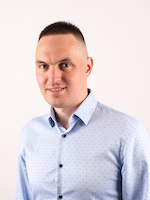 | Maxim Krupskiy is a human rights defender, attorney, and Ph.D. (Candidate of Science in Philosophy) with more than twelve years of law practice in Russia defending refugees, civil activists persecuted by the Russian authorities, and NGOs recognized as "foreign agents." Throughout his professional career he has specialized in the protection of human rights and fundamental freedoms. Since 2011, Krupskiy has represented clients in cases related to migration law (refugees and asylum seekers), including cooperation with the UNHCR. Since 2014, he has defended dozens of civil activists persecuted by the Russian authorities for participating in peaceful public events (demonstrations and pickets), including representing their interests at the ECHR. Since the adoption of "foreign agents" laws in Russia, he has represented many nonprofit human rights organizations in court, in cases challenging their inclusion in the "foreign agents" register and in cases of bringing them to administrative responsibility for violating "foreign agents" legislation. Over the past six years, as an independent expert, he has prepared more than forty independent anti-corruption expert opinions in the field of migration, administrative, environmental, criminal, criminal procedural legislation, and legislation on nonprofit organizations. His Ph.D. research, "The phenomenon of social anomie in a contemporary society," examines the role of NGOs and other forms of civic activism in creating social connections that are resistant to the challenges of modernity. Using the example of Russian society in a state of social entropy and bifurcation, he has shown that one of the main ways to overcome such a state can be social consolidation on the basis of the spontaneous civic activity of individuals. |
 | Yury Nadtochey has worked as an associate professor at the Department of World Politics at MGIMO University for many years. He taught a number of courses on the theory and history of international relations, as well as on world politics and EU politics to both bachelor's and master's students. Nadtochey holds a diploma in area studies (European Studies) from the School of International Relations of the Moscow University for the Humanities (2004). In 2005 he was an intern, and then a fellow of the PIR Center. He also took part in PIR Center International Summer School on Nonproliferation of WMD for experts from Russia and CIS countries. As part of his Ph.D. thesis, he completed an internship at the Luxembourg Institute for European and International Studies (2006). He received his Ph.D. in contemporary history from Moscow University for the Humanities (2008). His paper focused on the origin of unilateralism in the U.S. Euro-Atlantic policy after the Cold War. His area of expertise includes the security policy of NATO and EU members, transatlantic relations, security institutions in Europe, confidence-building measures, disarmament, and arms control. He has authored roughly 50 publications in a number of leading academic journals and is a regular contributor to the European Security Bulletin, published by INION Russian Academy of Sciences. |
 | Oleg Shakirov is a researcher focusing on international cyber policy and arms control issues, as well as on Russia’s foreign policy and modern diplomacy. He is a Consultant at PIR Center and a member of the Younger Generation Leaders Network on Euro-Atlantic Security. Previously he held research positions at the Moscow-based policy think tanks Center for Strategic Research and Center for Advanced Governance, and worked at the Russian Diplomatic Academy. He presented on cyber security at various venues including at the 2018 UNIDIR Cyber Stability Conference, the Hague Program on Cyber Norms annual conferences, the Kaspersky Industrial Cybersecurity Conference 2021, and Hack the Capitol 4.0. He holds a master’s degree from the Johns Hopkins University School of Advanced International Studies (2015) and a specialist degree from the South Ural State University (2010). |
 | Stanislav Stanskikh is Russia’s constitutional scholar in exile, human rights and anti-war activist, and legal expert on post-Soviet country conditions for U.S. immigration cases. After graduating from Lomonosov Moscow State University School of Law, he worked at the Government Relations Department of TNK-BP (Fortune 500) and served as the Executive Director of the Russian Foundation for Constitutional Reforms and founding Deputy Editor-In-Chief of the Russian Constitutional Court’s academic law review, among other positions. He was involved in civic protests and the anti-corruption movement in Russia, being an outspoken critic of Russia’s personalistic regime, the annexation of Crimea, and aggression in Ukraine. The escalation of repressions against intellectuals, human rights activists, and political opposition led to Stanislav’s political emigration from Russia to the U.S. He has been playing an active role in Russia’s democratic diaspora providing expertise to the Free Russia Foundation, the Free Russia Forum, and other diaspora organizations. In 2020, he initiated a popular petition campaign against amendments to Russia's constitution. Currently, Stanislav is a Research Fellow at UNC-Chapel Hill and a member of the Post-Communist Politics and Economics Workshop at Harvard’s Davis Center. As a legal expert on country conditions, he closely collaborates with the Law Offices of Palant&Lust. |
 | Andrey Todorov is a Postdoctoral Research Fellow at Harvard Kennedy School’s Arctic Initiative, as well as Senior Researcher at the Primakov Institute of World Economy and International Relations at the Russian Academy of Sciences. He holds a Ph.D. in Law from the Moscow State Linguistic University, with research interests in the Arctic Ocean governance and the international Law of the Sea. He worked in the Legal Department of the Russian Ministry of Foreign Affairs, where he focused mainly on various issues of the Oceans Law. Following that, as a researcher, he supplemented this experience with more in-depth scholarly study of the Law of the Sea, mostly from a regional Arctic perspective, with a focus on the protection of Arctic marine biodiversity from human activities, regulation of Arctic shipping, and managing legal disputes in the Arctic. His research at The Fletcher School was related to the legal status of, and the regime of navigation in, the waters of the Northern Sea Route. |